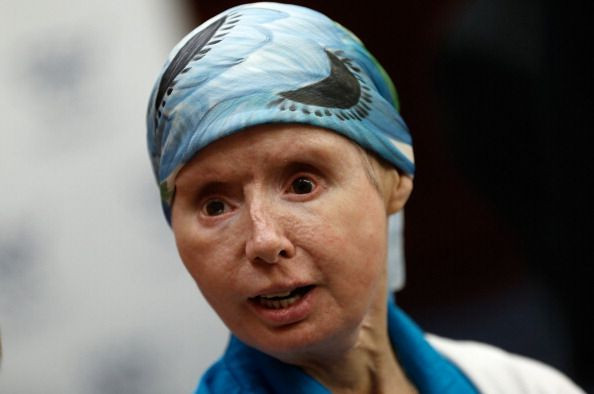After Chimpanzee Attack And Full Face Transplant, Charla Nash's Body Is Rejecting The New Organ

In 2011, Charla Nash underwent a complete face transplant after her own face was torn off during a brutal chimpanzee attack. Now, five years later, her body has begun to reject the transplant. Thankfully, the rejection is only moderate, and her doctors believe that the transplant can be saved and that she'll most likely leave the hospital within the next few days.
Nash’s complete face transplant was fully funded by the U.S. government and the findings could hopefully help soldiers who had transplants after returning from war, the Associated Press reported. Nash has been on immunosuppressive medications for the past five years to help prevent her body’s immune system from rejecting the foreign body part. However, these medications can be extremely stressful on the body over a long period of time, leading to a number of major complications.
For that reason, military doctors were interested in seeing if Nash could be weaned off her medications. Unfortunately, she experienced a “moderate rejection episode” after her medication was stopped, Dr. Bohdan Pomahac, director of plastic surgery transplantation at Brigham and Women’s Hospital told the AP.
Nash has now been removed from the experiment and put on her original medication. She will likely recover from the rejection and her transplant is not believed to be in danger.
"I gave it my all and know my participation in the study will still be beneficial," Nash said in a statement released to the AP. "I'd do it all over again if I could. The men and women serving our country are the true heroes."
Surgery is only one part of receiving a transplant. Nearly everyone who receives an organ transplant must then take immunosuppressant drugs so that the body does not try to attack the organ. Most work by interfering with the synthesis of DNA in your cells to prevent the immune system cells from dividing correctly. This causes them to eventually die.
According to Healthline, the immunosuppressant drugs in a patient’s regimen can be adjusted and reduced over time, but most people who have had a transplant need to take at least one immunosuppressive drug for their lifetime.
Unfortunately, these drugs come with a number of serious health risks. Because they work to suppress the body’s immune system from working to it’s fullest, these patients also become more susceptible to other diseases. Patients who are on immunosuppressants are advised to stay away from the visibly ill and make sure to maintain good personal hygiene in order to prevent the risk of infection. In addition, these drugs can increase an individual's lifetime risk of developing cancer.
Despite the risks, it's still critical to take these medications. Research has shown that individuals who fail to keep up with taking their medications often see fatal results. For example, one study showed that skipping medication leads to a 26 percent mortality rate within one year and a 33 percent risk of death over the course of two years. Unfortunately, this problem is most often seen among adolescent transplant patients, and nonadherence to an immunosuppressive drug regimen is recognized as the leading cause of organ rejection in teen transplant patients.
Published by Medicaldaily.com



























